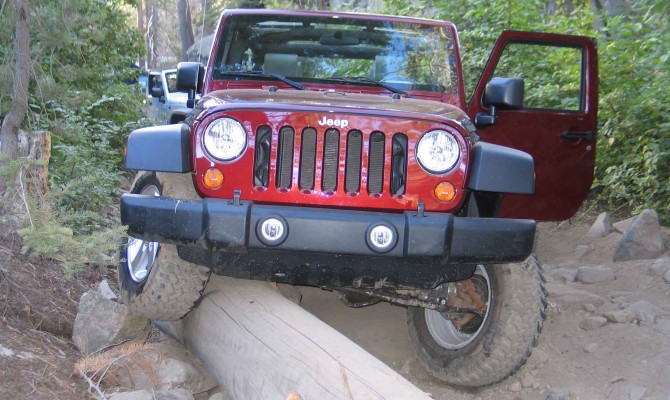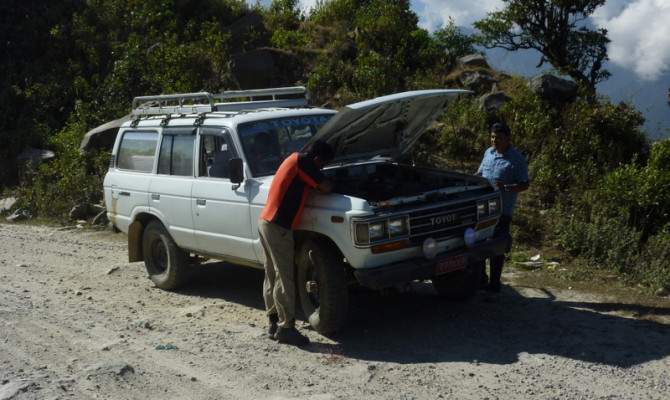If you choose to go off alone, give yourself an out, do not go further than you can walk out and find help or shelter before dark…
Your off-road fun can be seriously soured by a backwoods breakdown.
Before you head out, give some serious thought about what you would do if a major breakdown occurred. Ask yourself if you could deal with it on a little used trail with no one else around.
Firstly, you should never go it alone on a remote, seldom used trail. This is a good reason why 4X4 clubs are popular.
Even if you do not join a club, trail ride events are scheduled most times of the year and everywhere in the province. There is security here, with all kinds of help if you have any problems. It is also the best way to gain off highway experience.
If you choose to go off alone, give yourself an out, do not go further than you can walk out and find help or shelter before dark. Carry food and water enough in case you have to spend the night with a broken down vehicle. Be prepared for an accident with first aid supplies and training on how to deal with injuries. Always let someone know where you are going and when you will be back.
There are lots of things that can cause mechanical failures off-road. If you drive your vehicle regularly these things should show up when and where it is easier to deal with them than in the bush. Every situation is different so it would be impossible to list every possible cause and repair procedure for a breakdown.
Here are two of the most common types, starting with tires. Getting a flat tire is by far the most common type of breakdown. Always carry a good full sized spare tire. You might want to pack a plug kit, but most of the tire problems I have seen are either not repairable. An essential item is an air compressor. Airing down to gain better traction is only outweighed by the increased ride quality. This will increase the odds of a lost tire bead however.
Make sure your jack is in good working order. If you carry a High Lift Jack on the outside of your vehicle, check and oil it often. Another handy item for tire work is a nylon winch hold down strap. These can be put around the centre of the tread and tightened to re-seat the bead.
The second is breakage due to over-working your vehicle. The weakest link in the drive train seems to be the U-joints. If you break a U-joint there is a good probability that you will damage the yoke as well. This usually is not a trail side repair. Just remember that you are driving a four-wheel drive vehicle and you can most often get home with the front or rear drive disconnected. You will need to remove the drive shaft with the broken U-joint so that further damage is not done, then drive out in two-wheel drive. If this is a front axle steering knuckle U-joint, the half shaft will need to be removed and a rag stuffed into the end of the open axle housing.
Print the following comprehensive list and post it on the fridge door!
**********
Breakdown Essentials
1. Tool kit
2. Electrical repair kit (test light, wire, an assortment of wire terminals and wire terminal pliers.)
3. Jumper cables
4. Air compressor and hose.
5. Bailing wire
6. Latex gloves (these are great if you have to mess with a greasy U-joint and don’t have a good way to clean your hands along the trail.)
7.8’ X 10’ tarp (This is so much better to lay on instead of the ground when working under the vehicle.)
8. Low and high pressure tire gauges.
9. Tire repair kit
10. 3 or 4 quarts of engine oil (You can use this in a pinch for rear end and manual transmission oil)
11. 3 or 4 quarts of automatic transmission fluid (for automatic transmissions only)
12. A pint of brake fluid
13. Engine oil filter and filter wrench
14. Cargo boxes that you can put all this stuff into
15. Hold down straps to secure the cargo boxes
16. Leather gloves (for handling hot parts and winch cables)
17. Coveralls (it is nice to be clean after the repairs are made)
18. Any special tools that are vehicle specific.
19. Any parts that seem to break often on your vehicle
20. Jack
21. Tow strap
22. Flashlight with extra batteries
23. Full size spare tire
24. Propane torch
25. Acid core solder
26. Roll of paper shop towels
27. Can of WD-40
28. Plastic garbage bag (to cover large parts, doubles as raincoat)
29. Zip lock bags (to put small parts in)
30. Winch (if you go it alone self-recovery is very important) and kit with tree saver, snatch block, clevis etc.
Recent Comments
- { Enjoyed your Forest of Bowland in the BMW X5M, particularly the photo of the BMW in front of the main part of Stonyhurst College where... }
- { Bantam designed the Jeep, not Willy's or Ford. The American military gave the original Bantam prototype to Willys and Ford to copy. There is plenty... }
- { All Escalades come with a 6.2-lilter V8 engine that produces 420 horsepower. A six-speed automatic is the only transmission offered and drives the rear wheels.... }
- { Alexandra is an excellent journalist. }
Popular Posts
- Journey to a ‘Sparkling’ Luxury Okanagan Resort “Four lucky readers will put a Dodge Journey’s weekend-...
- The Need For Speed: Hike Those Highway Limits More than half of those polled believe the province sho...
- Drives-U-Crazy… Erratic drivers. An early morning drive from Kelowna to Vancouver is nor...
- Readers Respond: The Pros and Cons of Increasing B.C. Speed Limits Increasing the speed limits will only increase risk to...
- Honda CR-V Review: The Compact Crossover To Get Things Done The CRV is a very stylish and aerodynamic crossover veh...








